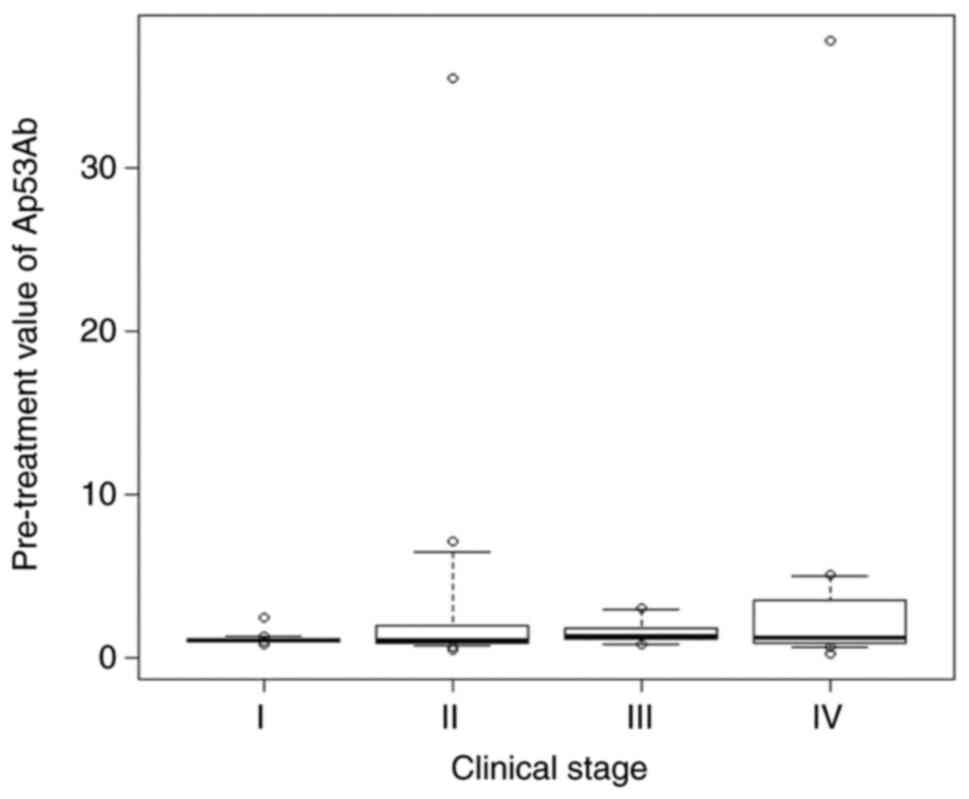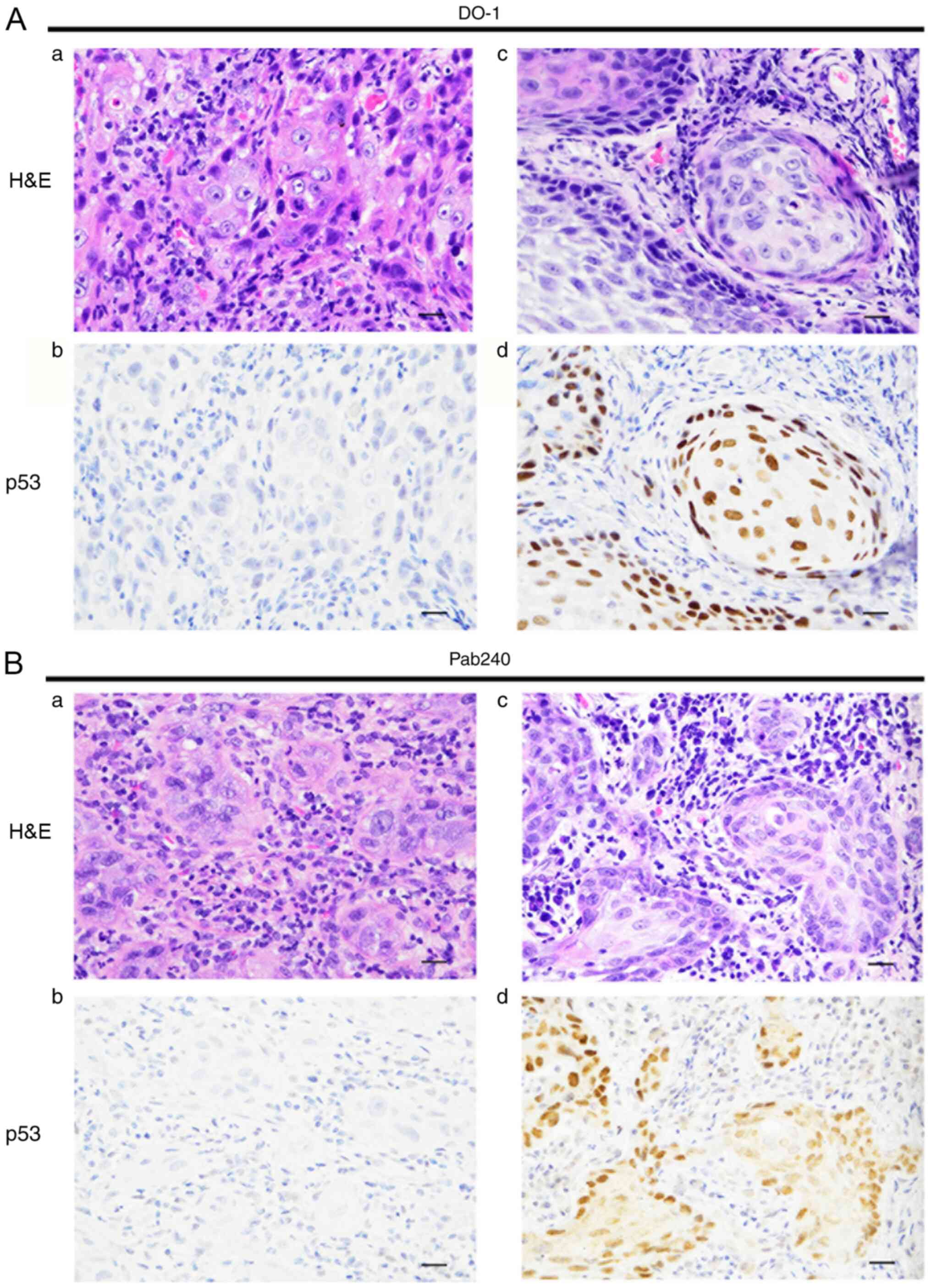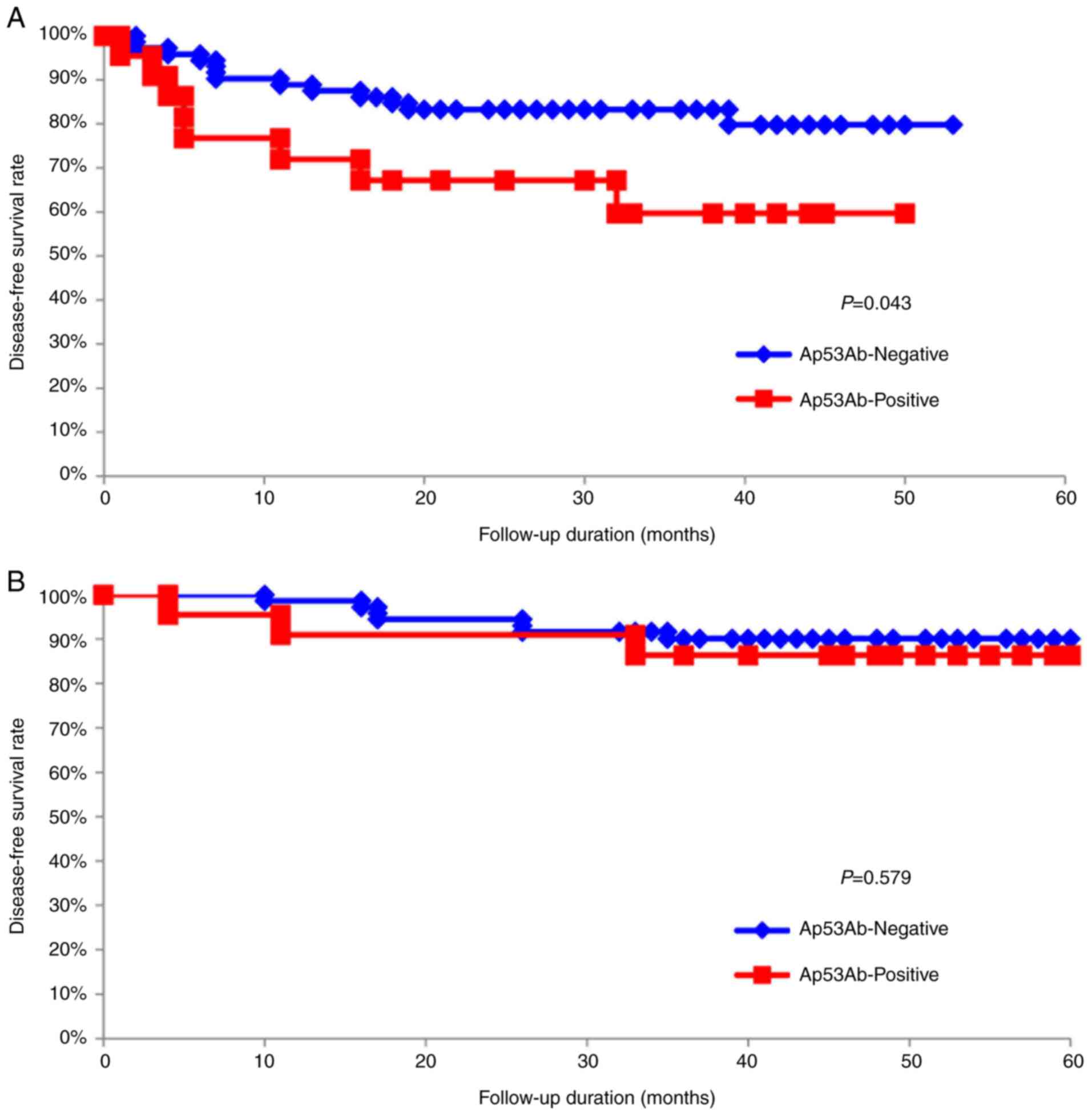|
1
|
Siegel RL, Miller KD and Jemal A: Cancer
statistics, 2017. CA Cancer J Clin. 67:7–30. 2017.PubMed/NCBI View Article : Google Scholar
|
|
2
|
Krimmel M, Hoffmann J, Krimmel C,
Cornelius CP and Schwenzer N: Relevance of SCC-Ag, CEA, CA 19.9 and
CA 125 for diagnosis and follow-up in oral cancer. J
Craniomaxillofac Surg. 26:243–248. 1998.PubMed/NCBI View Article : Google Scholar
|
|
3
|
Soussi T: p53 antibodies in the sera of
patients with various types of cancer: A review. Cancer Res.
60:1777–1788. 2000.PubMed/NCBI
|
|
4
|
Lubin R, Schlichtholz B, Teillaud JL,
Garay E, Bussel A and Wild CP: p53 antibodies in patients with
various types of cancer: Assay, identification, and
characterization. Clin Cancer Res. 1:1463–1469. 1995.PubMed/NCBI
|
|
5
|
Ushigome M, Shimada H, Miura Y, Yoshida K,
Kaneko T, Koda T, Nagashima Y, Suzuki T, Kagami S and Funahashi K:
Changing pattern of tumor markers in recurrent colorectal cancer
patients before surgery to recurrence: Serum p53 antibodies, CA19-9
and CEA. Int J Clin Oncol. 25:622–632. 2020.PubMed/NCBI View Article : Google Scholar
|
|
6
|
Couch ME, Ferris RL, Brennan JA, Koch WM,
Jaffee EM, Leibowitz MS, Nepom GT, Erlich HA and Sidransky D:
Alteration of cellular and humoral immunity by mutant p53 protein
and processed mutant peptide in head and neck cancer. Clin Cancer
Res. 13:7199–7206. 2007.PubMed/NCBI View Article : Google Scholar
|
|
7
|
Shimada H, Ochiai T and Nomura F: Japan
p53 Antibody Research Group. Titration of serum p53 antibodies in
1,085 patients with various types of malignant tumors: A
multiinstitutional analysis by the Japan p53 antibody research
group. Cancer. 97:682–689. 2003.PubMed/NCBI View Article : Google Scholar
|
|
8
|
Ralhan R, Agarwal S, Nath N, Mathur M,
Wasylyk B and Srivastava A: Correlation between p53 gene mutations
and circulating antibodies in betel- and tobacco-consuming North
Indian population. Oral Oncol. 37:243–250. 2001.PubMed/NCBI View Article : Google Scholar
|
|
9
|
Sainger RN, Shah MH, Desai AA, Shukla SN,
Shah PM, Telang SD and Patel PS: Clinical significance of serum p53
antibodies in oral cancer. Tumori. 92:134–139. 2006.PubMed/NCBI
|
|
10
|
Okada R, Otsuka Y, Wakabayashi T, Shinoda
M, Aoki T, Murakami M, Arizumi S, Yamamoto M, Aramaki O, Takayama
T, et al: Six autoantibodies as potential serum biomarkers of
hepatocellular carcinoma: A prospective multicenter study. Int J
Cancer. 147:2578–2586. 2020.PubMed/NCBI View Article : Google Scholar
|
|
11
|
Takashi S, Satoshi Y, Akihiko O, Naoya Y,
Yusuke T, Kentaro M, Yu O, Yasuaki N, Koichi Y, Takashi F, et al:
Clinical impact of preoperative serum p53 antibody titers in 1487
patients with surgically treated esophageal squamous cell
carcinoma: A multi-institutional study. Esophagus. 18:65–71.
2021.PubMed/NCBI View Article : Google Scholar
|
|
12
|
Oshima Y, Suzuki T, Yajima S, Nanami T,
Shiratori F, Funahashi K and Shimada H: Serum p53 antibody: Useful
for detecting gastric cancer but not for predicting prognosis after
surgery. Surg Today. 50:1402–1408. 2020.PubMed/NCBI View Article : Google Scholar
|
|
13
|
Zhou G, Liu Z and Myers JN: TP53 mutations
in head and neck squamous cell carcinoma and their impact on
disease progression and treatment response. J Cell Biochem.
117:2682–2692. 2016.PubMed/NCBI View Article : Google Scholar
|
|
14
|
Amin MB, Edge S, Greene F, Byrd DR,
Brookland RK, Washington MK, Gershenwald JE, Compton CC, Hess KR,
Sullivan DC (eds), et al: AJCC Cancer Staging Manual. 8th edition.
Springer International Publishing, New York, NY, 2017.
|
|
15
|
El-Naggar AK, Chan JC, Grandis JR, Takata
T, Grandis J and Slootweg P (eds): WHO Classification of Head and
Neck Tumours. 4th edition. IARC, Lyon, 2017.
|
|
16
|
Nasierowska-Guttmejer A, Trzeciak L,
Nowacki MP and Ostrowski J: p53 protein accumulation and p53 gene
mutation in colorectal cancer. Pathol Oncol Res. 6:275–279.
2000.PubMed/NCBI View Article : Google Scholar
|
|
17
|
Bertorelle R, Esposito G, Belluco C,
Bonaldi L, Del Mistro A, Nitti D, Lise M and Chieco-Bianchi L: p53
gene alterations and protein accumulation in colorectal cancer.
Clin Mol Pathol. 49:M85–M90. 1996.PubMed/NCBI
|
|
18
|
Poeta ML, Manola J, Goldwasser MA,
Forastiere A, Benoit N, Califano JA, Ridge JA, Goodwin J, Kenady D,
Saunders J, et al: TP53 mutations and survival in squamous-cell
carcinoma of the head and neck. N Engl J Med. 357:2552–2561.
2007.PubMed/NCBI View Article : Google Scholar
|
|
19
|
Bourhis J, Lubin R, Roche B, Koscielny S,
Bosq J, Dubois I, Talbot M, Marandas P, Schwaab G, Wibault P, et
al: Analysis of p53 serum antibodies in patients with head and neck
squamous cell carcinoma. J Natl Cancer Inst. 88:1228–1233.
1996.PubMed/NCBI View Article : Google Scholar
|
|
20
|
Maass JD, Gottschlich S, Goeroegh T,
Lippert BM and Werner JA: Head and neck cancer and
p53-immunogenicity. Anticancer Res. 17:2873–2874. 1997.PubMed/NCBI
|
|
21
|
Werner JA, Gottschlich S, Folz BJ,
Goeroegh T, Lippert BM, Maass JD and Rudert H: p53 serum antibodies
as prognostic indicator in head and neck cancer. Cancer Immunol
Immunother. 44:112–116. 1997.PubMed/NCBI View Article : Google Scholar
|
|
22
|
Wollenberg B, Jan NV, Pitzke P, Reiter W
and Stieber P: Anti-p53 antibodies in serum of smokers and head and
neck cancer patients. Anticancer Res. 17:413–418. 1997.PubMed/NCBI
|
|
23
|
Gottschlich S, Folz BJ, Goeroegh T,
Lippert BM, Maass JD and Werner JA: A new prognostic indicator for
head and neck cancer-p53 serum antibodies? Anticancer Res.
19:2703–2705. 1999.PubMed/NCBI
|
|
24
|
Gottschlich S, Maune S, Maass JD, Görögh
T, Hoffmann M, Hoffmann-Fazel A, Meyer J, Werner JA and Rudert H:
Serum p53 autoantibodies in the follow-up of head and neck cancer
patients. Oncology. 59:31–35. 2000.PubMed/NCBI View Article : Google Scholar
|
|
25
|
Warnakulasuriya S, Soussi T, Maher R,
Johnson N and Tavassoli M: Expression of p53 in oral squamous cell
carcinoma is associated with the presence of IgG and IgA p53
autoantibodies in sera and saliva of the patients. J Pathol.
192:52–57. 2000.PubMed/NCBI View Article : Google Scholar
|
|
26
|
Chow V, Yuen AP, Lam KY, Ho WK and Wei WI:
Prognostic significance of serum p53 protein and p53 antibody in
patients with surgical treatment for head and neck squamous cell
carcinoma. Head Neck. 23:286–291. 2001.PubMed/NCBI View
Article : Google Scholar
|
|
27
|
Yamazaki Y, Chiba I, Ishikawa M, Satoh C,
Notani K, Ohiro Y, Totsuka Y, Mizuno S and Kitagawa Y: Serum p53
antibodies as a prognostic indicator in oral squamous cell
carcinoma. Odontology. 96:32–37. 2008.PubMed/NCBI View Article : Google Scholar
|
|
28
|
Takahashi R, Sakamoto K, Sugimoto K,
Motegi S, Tsukamoto R, Ichikawa R, Okazawa Y, Aoki J, Ishiyama S,
Takahashi M, et al: Significance of serum p53 antibody as a tumor
marker in colorectal cancer. Dis Markers.
2019(2721876)2019.PubMed/NCBI View Article : Google Scholar
|
|
29
|
von Brevern MC, Hollstein MC, Cawley HM,
De Benedetti VM, Bennett WP, Liang L, He AG, Zhu SM, Tursz T, Janin
N and Trivers GE: Circulating anti-p53 antibodies in esophageal
cancer patients are found predominantly in individuals with p53
core domain mutations in their tumors. Cancer Res. 56:4917–4921.
1996.PubMed/NCBI
|
|
30
|
Davidoff AM, Iglehart JD and Marks JR:
Immune response to p53 is dependent upon p53/HSP70 complexes in
breast cancers. Proc Natl Acad Sci USA. 89:3439–3442.
1992.PubMed/NCBI View Article : Google Scholar
|
|
31
|
Schlichtholz B, Legros Y, Gillet D,
Gaillard C, Marty M, Lane D, Calvo F and Soussi T: The immune
response to p53 in breast cancer patients is directed against
immunodominant epitopes unrelated to the mutational hot spot.
Cancer Res. 52:6380–6384. 1992.PubMed/NCBI
|
|
32
|
George B, Datar RH, Wu L, Cai J, Patten N,
Beil SJ, Groshen S, Stein J, Skinner D, Jones PA, et al: p53 gene
and protein status: The role of p53 alterations in predicting
outcome in patients with bladder cancer. J Clin Oncol.
25:5352–5358. 2007.PubMed/NCBI View Article : Google Scholar
|
|
33
|
Dix B, Robbins P, Carrello S, House A and
Iacopetta B: Comparison of p53 gene mutation and protein
overexpression in colorectal carcinomas. Br J Cancer. 70:585–590.
1994.PubMed/NCBI View Article : Google Scholar
|
|
34
|
Yemelyanova A, Vang R, Kshirsagar M, Lu D,
Marks MA, Shih IeM and Kurman RJ: Immunohistochemical staining
patterns of p53 can serve as a surrogate marker for TP53 mutations
in ovarian carcinoma: An immunohistochemical and nucleotide
sequencing analysis. Mod Pathol. 24:1248–1253. 2011.PubMed/NCBI View Article : Google Scholar
|
|
35
|
Porrini R, Vercellino V, Rocchetti V, Renò
F, Giorda E, Pomato E, Cannas M and Sabbatini M: Serum anti-p53
antibodies as a diagnostic tumor marker: Observations in patients
with malignant and premalignant oral cavity lesions. Minerva
Stomatol. 59:233–243. 2010.PubMed/NCBI
|
|
36
|
Sano D, Xie TX, Ow TJ, Zhao M, Pickering
CR, Zhou G, Sandulache VC, Wheeler DA, Gibbs RA, Caulin C and Myers
JN: Disruptive TP53 mutation is associated with aggressive disease
characteristics in an orthotopic murine model of oral tongue
cancer. Clin Cancer Res. 17:6658–6670. 2011.PubMed/NCBI View Article : Google Scholar
|
|
37
|
Yamaguchi T, Takii Y and Maruyama S:
Usefulness of serum p53 antibody measurement in colorectal cancer:
An examination of 1384 primary colorectal cancer patients. Surg
Today. 44:1529–1535. 2014.PubMed/NCBI View Article : Google Scholar
|
|
38
|
Sirotković-Skerlev M, Plavetić ND, Sedlić
F, Kuna SK, Vrbanec D, Belev B, Pleština S, Kovač Z and Kulić A:
Prognostic value of circulating Bcl-2 and anti-p53 antibodies in
patients with breast cancer: A long term follow-up (17.5 years).
Cancer Biomark. 30:95–104. 2021.PubMed/NCBI View Article : Google Scholar
|

















